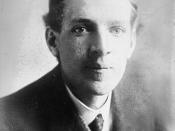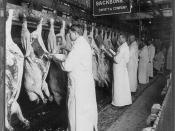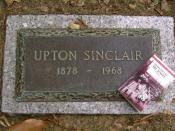Upton Sinclair wrote The Jungle in response to Andrew Carnegie's claim that "while capitalism may be hard for the individual it is best for the race because it insures survival of the fittest." Sinclair's Jurgis Rudkus is clearly a man equipped to survive in a world based on social Darwinism, yet by the end of Chapter 16 Jurgis appears beaten. How do you explain Jurgis' failure to succeed in America? Address economic, social and political concerns. Support your argument with quotations from the book and concrete historical fact.
"They put him in a place where the snow could not beat in, where the cold could not eat through his bones; they brought him food and drink-why, in the name of heaven, if they must punish him, did they not put his family in jail and leave him outside-why could they find no better way to punish him than to leave three weak women and six helpless children to starve and freeze?" (Sinclair, 160) The Jungle, by Upton Sinclair, was written as a counter to Andrew Carnegie's Wealth.
The Jungle portrays the capitalist system in America as corrupt and evil. The protagonist, Jurgis Rudkus and his family faces hardship after hardship, each one slowly breaking apart their family. From the time Jurgis stepped off the boat in America, the cards were stacked against him; he could not speak, read, or write English, he was poor, and he was honest. Just one of the afore mentioned qualities could make life difficult, however the combination doomed Jurgis from the beginning of the book.
The capitalist system in place during the turn of the century was fashioned to ensure that the rich and powerful remained rich and powerful, and the poor remained poor. The rich were able to manipulate the government at their...


